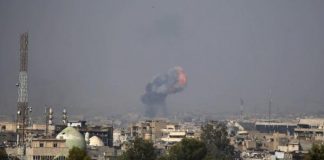Kurds
Turkey and the Middle East with the eyes of nationalist Yeni...
This is the biggest threat in the history of the Turkish Republic
By İbrahim Karagül
We are facing “a new situation” that will turn enemies into...
Kurdish government ‘happy’ about expanding energy partnership with Russia
Published in http://russiafeed.com
The Kurdistan Regional Government has signed deals with several Russian oil and gas factories and is glad about the development of partnership...
Turkish Fears
Urgent intervention required: Otherwise we will live to regret it!
By İbrahim Karagül
The terror corridor formed in Syria’s north is a plan to annihilate Turkey....
Don’t be Fooled, the CIA was Only Half the Problem in...
By Steven MacMillan
Wednesday, August 2, 2017
www.4thmedia.org
The news that President Trump has halted the CIA program to arm and train rebel groups in Syria should...
Ankara decries ‘provocative’ remarks by US anti-IS envoy
By Amberin Zaman
www.al-monitor.com
Turkish fury over the United States’ ongoing partnership with the Syrian Kurds showed no signs of abating as Ankara made a formal...
Military setbacks don’t ensure Islamic State’s demise
By Metin Gurcan
www.al-monitor.com
As Mosul was liberated last week from the Islamic State (IS) after a yearlong military struggle, Iraqi Prime Minister Haider al-Abadi defined it as the “collapse...
No western reporters for Mosul – They are all busy...
The Holocaust of Mosul: US commit the Crime, the World remains silent. They channeled Sunni Resistance into ISIS and then destroyed them. How to...
Dispatch From the Middle East: U.S. Buildup All About Iran
Requiring an American wedge between Syria and Iraq.
By Sharmine Narwani*
June 28, 2017
DAMASCUS—As the drive to push ISIS out of its remaining territories in Syria...
Mossoul : Amnesty dénonce de “graves violations du droit international humanitaire”...
Libération de Mossoul : Amnesty dénonce de “graves violations du droit international humanitaire” et des “crimes de guerre”
Le Premier ministre irakien Haider Al-Abadi a...
A Shameful Silence: Where is the Outrage Over the Slaughter of...
The Holocaust of Mosul: US commit the Crime, the World remains silent. They channeled Sunni Resistance into ISIS and then destroyed them. How to...








